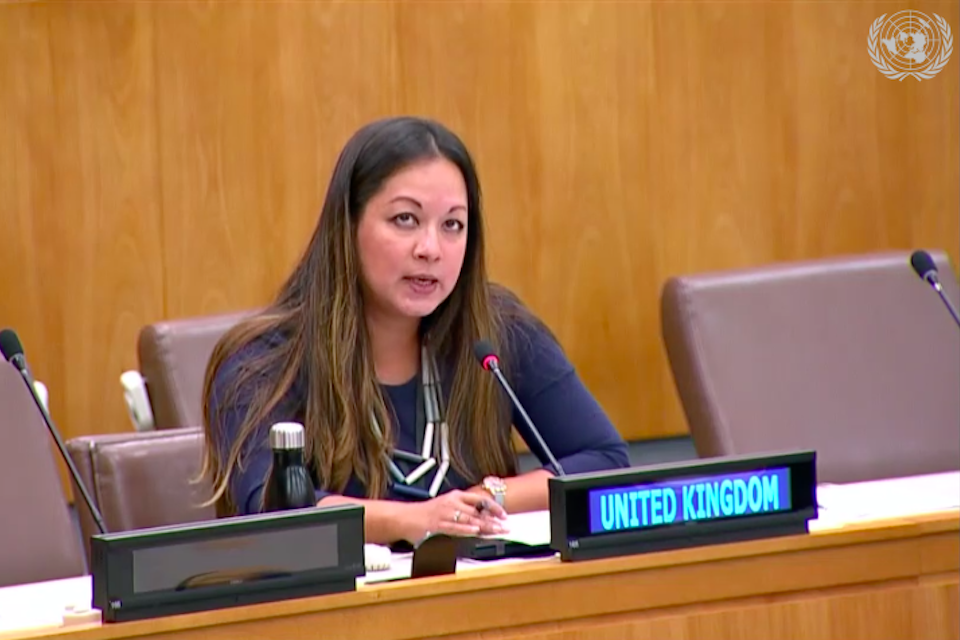
Measures to eliminate international terrorism
Published By GOV.UK [English], Thu, Oct 8, 2020 3:04 PM
Mr Chair,
At the outset, let me congratulate you and members of the Bureau on your election.
This has been an extraordinary year and I would like to recognise the considerable efforts made to ensure we can continue our consideration of critical issues.
The United Kingdom wishes to underscore five additional points.
First, we are gathered under the shadow of COVID 19 and its impact on almost everything. While it is still early to know the long-term effects on terrorism, with more people at home in front of computers – especially young people – we are concerned about terrorist use of the internet to mobilise and recruit support and perpetuate their dangerous narratives.
The drivers of terrorism and extremism are multifaceted and complex. In our long-term efforts to reduce the threat of terrorism, however, we need to ensure that good governance, rule of law and programmes on poverty reduction are maintained to allow healthy, prosperous societies to flourish.
Second, terrorists and violent extremists have continued to adapt their outreach and methods. While Daesh may have lost territorial control, it continues to perpetuate its ideology and objectives through its network and affiliates, and Al-Qaida remains a persistent threat. However, terrorist attacks continue to be motivated by a range of ideologies, and the rise of right wing extremism and terrorism confirms that terrorists have no single identity, religion or nationality. We encourage all states to join the Open Briefing organised by CTED on behalf of the CTC, on 9 October and contribute to the discussions on this important topic.
Third, civil society and humanitarian actors continue to provide critical assistance in some of the most complex conflict zones and under tremendously difficult conditions due to Covid. We welcomed the increased focus on the protection of principled humanitarian action in the Security Council’s counterterrorism resolutions last year. We look forward to continuing to work with all relevant partners to ensure that counterterrorism measures are implemented in accordance with international law, while also upholding counterterrorism obligations set out by the Security Council.
Fourth, the frameworks set out by the Security Council and the General Assembly consistently stress the importance of human rights to preventing and countering terrorism and violent extremism. The United Kingdom continues to stress that human rights and effective counterterrorism are not mutually exclusive but rather that integrating human rights and gender considerations throughout the full spectrum of counterterrorism activity is essential for credible, sustainable and effective responses. We have seen that gross violations of human rights can play a role in creating an enabling environment for the development of grievances and conditions that can fuel terrorism.
The United Kingdom reiterates the importance also of integrating gender throughout the full spectrum of counterterrorism efforts. On this historic anniversary of the WPS agenda, it is critical to ensure that we challenge old stereotypes and recognise that for responses to be right, we need to ensure the meaningful participation of women in all stages of counterterrorism, from planning to implementation and evaluation.
Mr. Chair,
A year ago this week, the Security Council Counter-Terrorism Executive Directorate (CTED) conducted its second assessment visit to the United Kingdom, which included robust and comprehensive discussions on all aspects of counterterrorism and PVE. We are hoping to soon see the finalised report. We proactively invited this follow-up visit because we wanted to share our lessons-learned, good practices and experiences, as well as identifying emerging trends and dynamics. No country can fight terrorism alone and we welcome opportunities to learn from others and collectively improve our responses. We encourage other states to work with CTED and use the assessment visits to share their counterterrorism experiences and identify their CT priorities and needs. The recommendations in the report should form the basis for support provided by the UN system, as these recommendations are approved by the visited state, developed by specialised CT experts and in line with all their counterterrorism obligations.
Fifth, the global mission to raise aviation security standards must continue in line with the landmark Security Council Resolution 2309 to ensure a shared global understanding of the current threat to aviation where all Member States fully meet their aviation security obligations and move towards the implementation of the Global Aviation Security Plan. We are pleased that the Counter-Terrorism Committee will hold an Open Briefing on this topic later this year. We encourage Member States to share their experiences and good practices in implementing Security Council resolution 2309.
In conclusion, now, more than ever, we must collectively ensure that terrorists and violent extremists cannot exploit this pandemic to perpetrate their horrific attacks, and further exacerbate the suffering of communities at this time. The United Kingdom will continue to work with Spain and Egypt, Member State partners, the UN, and civil society, as we look to the review of the UN Global Counterterrorism Strategy next year. The threat landscape is continually evolving and we must ensure that we are collectively prepared and that our institutions and our tools are fit for purpose.
Press release distributed by Media Pigeon on behalf of GOV.UK, on Oct 8, 2020. For more information subscribe and follow